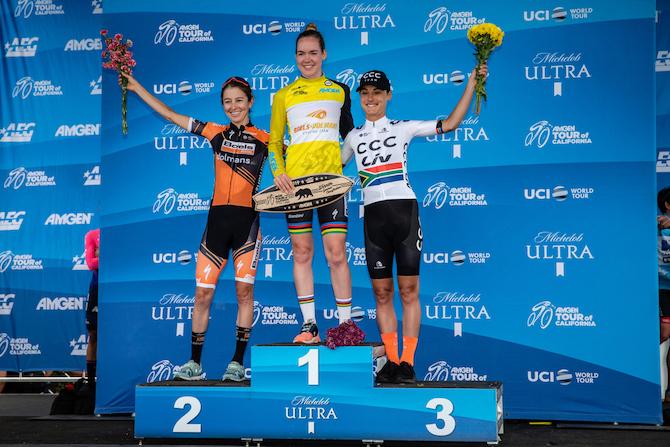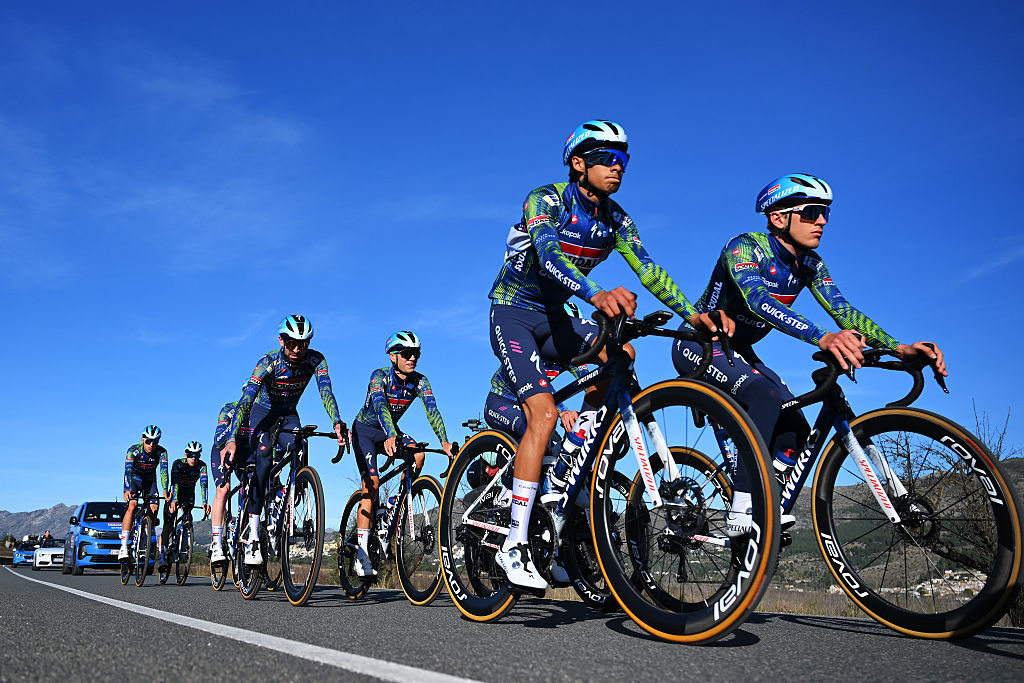Tour of California hiatus unlikely related to equality law
Bertine defends push for equal pay against speculation

Following AEG's announcement that it has put the Amgen Tour of California on a 'hiatus' for 2020, the loss of the only UCI Women's WorldTour race in North America, in addition to the men's race, rang out as a particularly hard blow.
There was immediate speculation across social media that the race's troubles were related to the new California law championed by former racer Kathryn Bertine, AB467, that required organisers to provide equal pay for men and women in order to secure permits to run events on state lands.
Following the passage of the law in September, AEG's Vice President of Communications, Michael Roth, told Cyclingnews that he felt the race's current model of having equal prize money for men and women when they race on the same days would comply with the new law. In 2019, the men and women shared three stages.
Bertine, however, speculated that the AB467 might have made an impact on the Tour of California given that the women only raced for three of the seven days.
"The bill would provide the platform needed to change the Tour of California because paying women for three days instead of seven days isn't equal," Bertine told Cyclingnews.
"Equal pay for equal play is a two-part equation. So, if the women are only being paid 'equally' for three days, but they aren't allowed to work for seven days, then that isn't equal."
Although AEG would not comment on what factors led to the race's hiatus on Tuesday, it is unlikely that prize purses, which are a small fraction of the event's multi-million dollar budget, were a critical aspect of the decision.
The latest race content, interviews, features, reviews and expert buying guides, direct to your inbox!
Bertine, in addition to helping push AB467 through, was instrumental in pushing the Tour de France organisers ASO (who also serve as the Tour of California's technical producers) to hold the women's La Course by Tour de France to give women a platform on the biggest stage.
She said she has been a big fan of the Tour of California, and had hoped in 2020 it could have been the first stage race with true equity between men and women.
"We have the statistics and data to prove that the women's pro races are watched, they have supporters and significant financial value in return of investment," Bertine told Cyclingnews.
"I hope AEG and ASO will heed the call of the fans—and data!—and create equity. Tour of California will find substantial gains, wider support and lucrative investment when they finally include women equally.
"I do hold out hope that the race is only on a hiatus, and that the door remains open for an equitable event."
Increasing costs of securing open roads for 1,251km across California is a more likely factor. The state is currently experiencing mass evacuations as devastating wildfires spread in both Northern and Southern California, increasing costs for police and fire departments. The host cities may be less willing to dole out large sums for the race and overburdened emergency services may be stretched too thin to devote resources to the event.
In addition to paying to close the roads, race organisers face numerous other costs such as fees to the UCI, anti-doping, paying to bring over WorldTour teams and house them, and producing live television and internet streaming video.
Cycling has continued to struggle to find a business model capable of supporting the costs of stage races, and the number of high-level road events has been shrinking as mass-participation events have risen in popularity.
With the hiatus of the WorldTour men's race, there now remains only two one-day WorldTour races, in the GP Quebec and GP Montreal, and one major UCI stage race for men – the Tour of Utah – in North America.
The hiatus of the Amgen Women's Race means there will be no North American Women's WorldTour races and only two UCI classified stage races left on the continent: the 2.1-ranked Colorado Classic and the 2.2-ranked Joe Martin Stage Race.
"I think 'hiatus' has the potential to be a good thing," Bertine told Cyclingnews. "A hiatus – rather than straight-up ending or cancelling of the Tour of California – could give AEG and ASO an opportunity to come back stronger in 2021."

Laura Weislo has been with Cyclingnews since 2006 after making a switch from a career in science. As Managing Editor, she coordinates coverage for North American events and global news. As former elite-level road racer who dabbled in cyclo-cross and track, Laura has a passion for all three disciplines. When not working she likes to go camping and explore lesser traveled roads, paths and gravel tracks. Laura specialises in covering doping, anti-doping, UCI governance and performing data analysis.
